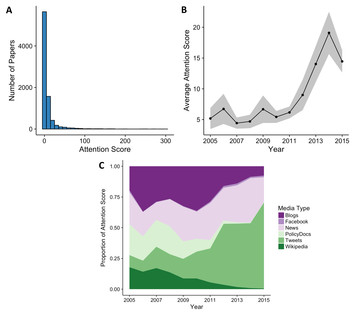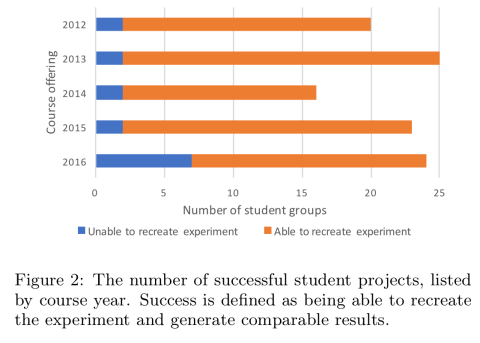Early Career Researchers Want Open Science
On the task of changing scientific research into open scientific research and commiting to Open Science principles.

Send us a link
On the task of changing scientific research into open scientific research and commiting to Open Science principles.

Imagine succinct, up-to-date information, not for software projects but for modern research publications.
We describe curation projects as a new category of GitHub project that collects, evaluates, and preserves resources for software developers.

A survey of researchers at the Montreal Neurological Institute and Hospital provides insights into the challenges and opportunities involved in adopting an open science policy across an entire patient-oriented academic institution.
Students taking Stanford’s Advanced Topics in Networking class have to select a networking research paper and reproduce a result from it as part of a three-week pair project.

Scholarly profile pages constructed from queries to information in Wikidata.
The Commission made the Declaration of the European Open Science Cloud (EOSC) available to all scientific stakeholders, for their endorsement and commitments to the realisation by 2020.
Reviewing preprints provides feedback to the authors and helps involve more scientists in peer review.
Hindawi’s CEO, Paul Peters, explains the problems inherent in proprietary solutions for Open Science infrastructure and presents a proposal for how things can be done differently.

A movement to make the fruits of research available without charge has helped students and faculty members gain access to an increasing number of academic articles.

Repurposing continuous integration tools for scientific analyses takes the headache out of reproducible research.
100+ volunteers sharing their knowledge about Open Science and contributing to what they see as an extremely important issue in nowadays and future science.
If you’re a researcher writing software, this guide will show you how to make the work you share on GitHub citable.
An open document that tries to provide a concise analysis of where the global Open Science movement currently stands.
3 case studies that highlight the challenges surrounding decisions about how––and how best––to make things open.
My PhD thesis research was a dead end, but that’s why it was important.

The philosophy behind the Registered Report format is that the intrinsic value of science is in the rigor of the method, not the appeal of the results.
Opening up science so that all stages of the process can benefit from better interaction and communication and to provide examples for early career scientists writing grants.
Looking at some of the issues around the reuse of scientific data and open a conversation about how to deal with them.
Emerging technologies making computational reproducibility practical in both time and effort.
Recommendations by G7 to rewarding and incentivize Open Science practices and infrastructures for optimal use of research data.
As research and editorial processes become increasingly open, scientists and editors need to be proactive but also alert to risks.

The paper addresses the concepts and practices of “open notebook science” as an innovation within the contemporary Open Science movement.

The goal is to deliver an open-source submission and peer-review platform
Workshop on a growing threat to Europe's biodiversity and the role of Citizen Science and Open Data as a model.
With science needing to always be reviewed to be sure it is correct, using Post-publication peer review is useful for scientific accuracy.

Elsevier develops and implements comprehensive new journal data guidelines.
A few examples that demonstrate how universities design their open science guides.
